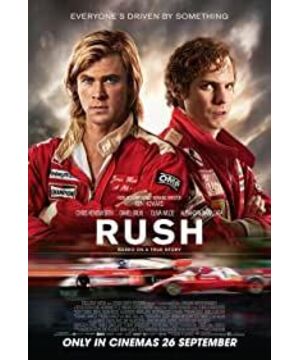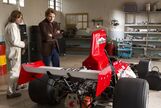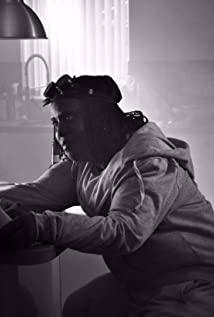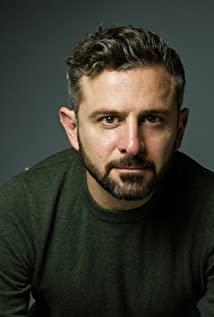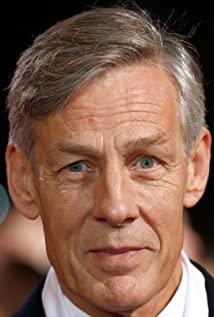He doesn't understand. He is not a fan, and he does not know more about the history of F1 in the 70s than ordinary people. He is still an American. As a guest on Top Gear, he only ran 1 minute 49.9 seconds, ranking second from the bottom. His closest relationship with the car is probably his youngest child, whom his wife conceived in a Volvo. God knows if Hollywood will mess things up, such as using the Nazca track to fool it? But the producers are obviously not trying to fool, they want a good movie, and they have good reasons to ask Howard to direct it. Ron Howard won two statuettes with "Beautiful Mind", and also directed "Foster's Dialogue with Nixon" and "Apollo 13". If you want to make the story of the greatest rival in F1 history compelling, Howard may be the best choice. The director also accomplished his mission brilliantly. Rush has been well received by everyone, whether it is a general audience or F1 fans, and even Niki Lauda himself.
How did he do it? The key may be that the director grasped the maddening essence of F1 in that era, and this essence is becoming more and more difficult to find in current competitions. For ordinary viewers, Rush can make people High and moving, but for F1 fans, watching this film is like a boring middle-aged looking back at youth, which is inevitable.
This essence stems from uncertainty. At that time, F1 was still growing wildly. On the one hand, the speed of racing has far exceeded the daily experience of ordinary people, and F1 has become the most talented sport; on the other hand, the team, the operator, the safety regulations, and the team are far from mature, miraculously reversed. Tragic accidents often occur, and the uncertainty and contingency of the game are very strong. As James said in the film, the racer is so close to death that he can feel alive so strongly. And this is the thing that makes a person the most adrenaline rush. In the movie, you can see Japanese car fans waiting in the rainstorm, the commentator holding the microphone and shouting, the photographer lying desperately on the grass, and the checkered flag waving on the track. It is so rough compared to the current F1, everyone in this sport is doing stupid things. Just like everyone was when they were young.
And the duel between those two people is undoubtedly the core theme of this crazy youth. In F1 now, although everyone knows that there are no friends in the paddock, on the surface, they always speak kindly. The competition at that time was exposed, and the film faithfully reflected this. In real history, neither James nor Niki have shy away from competition, and they have publicly expressed their strong desire to defeat the other. And this kind of desire has never been jealous, some is anger, and more is enjoyment. They all enjoy the feeling of being pushed to a desperate situation by the other party, and then beyond. Overtake, lead, and win the championship. This is their highest pursuit throughout their lives. Compared with this, everything else is secondary. Three views and lifestyles are not important. These are things that may obscure and weaken the highest pursuit. Niki realizes that lasting comfort and happiness are an enemy, why didn't James realize it? It's just that he doesn't have the self-consciousness like Niki, but needs to be awakened under the stimulation of his opponent. Although the movie took a lot of pen and ink to compare the two completely different lifestyles, it was all for the purpose of highlighting the similar fighting on the field, and the sympathy behind this fighting.
Some viewers may have the illusion that the battle on the field is an extension of two life attitudes, but the film tells everyone from the beginning that competition is competition. This is the nature of racers and has nothing to do with people's likes and dislikes. In fact, James and Hunt have never hated each other, they are more respectful. The end of the movie tells us this. In reality, Niki also said this: "……because I liked him, and we were not buddies but we were at least sympatico. We took care of each other from the heart in a very nice way, which in these days the heart was never shown in Formula One." They were clearly aware that the other side, like themselves, were the people who made the F1 hurricane history, and they were both the fastest.
In the current F1 field, the drivers may still have this kind of knightly blood, but they find that their armor seems to be more important than their swordsmanship. Fast is not necessarily displayed so directly. It will be distorted by the technical advantages generated by strong financial resources and strange rules. The duel between fast and faster cannot be passed on to the fans. What people see is the precise calculation. Step by step, like a bug-free program, running unstoppably, repeating the past self. People can't help but think of Romain Rowland's words: "Many people die after their 20s or 30s." Because of this, the appearance of being alive is particularly attractive.
Thank you for this film's conscientious display of this charm. Many shots in the film almost restore historical images. Many lines reflect reality (for example, Lauda divorced the first lady in reality). This is especially true for casting. Some characters in the film have communicated with the prototype. For details, please refer to http://www.historyvshollywood.com/reelfaces/rush.php
And the beautified place is also beautified by the skilled Hollywood skills. The close-up of the cylinder, suspension, and helmet are effective in making people's blood pulses, so that ordinary people can also feel the charm of F1. In the end, the director, who is good at biopics, completed an epic.
When asked how Niki Lauda views the film, Director Howard replied: "He said he was moved. I think it was because he looked back at that piece of history from this angle for the first time. He no longer remembers the accident. He only remembered that he was angry at the time and people talked about him not being able to come back to the game, so he blocked everything and wanted to return to the track. When he saw that so many things had happened at the time, he was touched a lot. "
View more about Rush reviews


